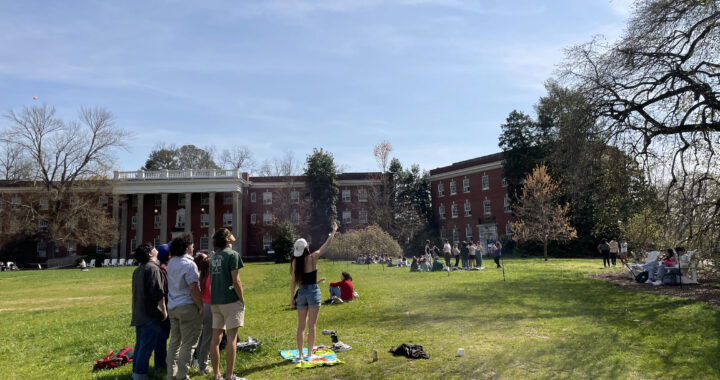Personal Essay: Why I stopped hating poetry
4 min read
For many people, there is a love-hate relationship with poetry. In this personal essay, Leigh Hatton describes the winding journey that they took to stop hating poetry. | Alfons Morales / Unsplash.com
by LEIGH HATTON
Senior Writer
Every student who has studied English, I should imagine, has at some point hated poetry, has at some point dismissed the expansive genre with a kind of heartfelt frustration. In my most anti-poetry days, I condemned it as an overdramatic distraction from real literature, and I felt it a personal affront that a lesbian in the present day should be required to analyze Donne’s erotic fantasies from 1633 or Wyatt’s comparison of women to hunting prizes—I condemned all poetry as an overly complex reinforcement of the patriarchy.
In the very way that James Baldwin felt dubious about Othello, I doubted every author I might have liked when I learned that they wrote poetry. As a diligent English major, I read the lines and even memorized them at times. Yet, I was in revolt against them, angry that I had to spend my evenings analyzing self-centered rhymes, penned by people I could not relate to.
Well, I was young and missed the point—so many different points in so many different poems—unable to see past the strange uses of syntax and punctuation. I remember vividly my shock when I had pulled a collection of Adrienne Rich’s poems off a bookstore shelf one March day. As I stood there skimming over them, I came across “Dedications”:
“I know you are reading this poem
standing up in a bookstore far from the ocean
on a grey day of early spring, faint flakes driven
across the plains’ enormous spaces around you.”
What I suddenly heard for the first time was manifold. The voice of Rich stretched across time and distance and I suddenly knew what she was saying—what it was like to wonder about the mind of a stranger living a different life. Yet, more than that, I understood why she, and other poets, wrote in the first place—that essential human longing for connection, to share one’s voice and have it echoed back across generations in a kind of endless, timeless dialogue.
I read “Dedications” twice more and then turned page after page, suddenly voracious for more newly found meaning. The lines I read come to mind even now, years later: the poem “Phantasia for Elvira Shatayev” reads, “but till now/we had not touched our strength”; “Love Poem XVII” reads, “No one’s fated or doomed to love anyone/The accidents happen, we’re not heroines/they happen in our lives like car crashes.” Rich wrote about so many things—trees, vampires, boats, Marie Curie, blackberries—and I knew that she was writing to me, to the world and also, yes, for herself.
My relationship to poetry, then, revealed itself to be my relationship to myself, my identity and my love for language. Like the sudden burst of colorful life when winter shifts into spring, poetry was rapidly vibrant and all around me. I read Sappho’s fragments, Richard Barnfield’s sonnets, Mary Oliver’s peaceful observations and Audre Lorde’s thought-provoking lines.
Even works I had been assigned to read before seemed to blossom with new meaning. While John Keats used to be dreaded on a syllabus, I now found solace in his odes. After being assigned three Alice Walker books, I sought out and devoured all of her poems. Even Shakespeare, who James Baldwin had such a conflicted relationship with, transformed for me. I, who was never overly emotional, was now moved to deep sadness by “Julius Caesar” and felt just as anguished as Hamlet.
If I had not liked poetry before, I had seen it as the authors’ fault, but perhaps it was my own. I had been sitting in classrooms and speaking to professors like a sleepwalker, my eyes closed to the reality right in front of me.
Poetry is nothing more or less than life. On some level, all poets understand this. They write what they know and feel and especially what they observe in the lives of people around them. Personal experiences that I have never found words for have been shaped into beautiful phrases by poets, as T. S. Eliot did in “The Love Song of J. Alfred Prufrock”:
“Do I dare
Disturb the universe?
In a minute there is time
For decisions and revisions which a minute will reverse.
For I have known them all already, known them all–
Have known the evenings, mornings, afternoons,
I have measured out my life in coffee spoons”
The minutiae of our daily lives in the face of the breadth of the universe—is this not the backbone of poetry? Every time I read these lines, I am still shocked at how much they communicate to me, a combination of specific images and the vaguest terms. I love being an English major, because now, when someone in class mentions a line, phrase or poem that they “love,” I know exactly what they feel. Anyone who patiently searches for meaning in poetry, like an archaeologist in a glorious ruin, will be able to find pieces of their own experience among the debris.
Inspired by “Why I Stopped Hating Shakespeare” by James Baldwin











